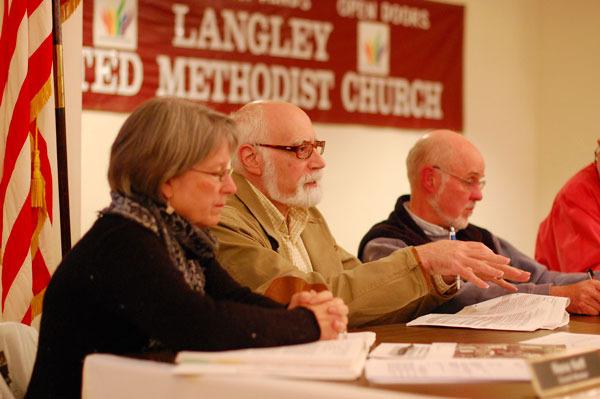Despite its popularity among some members of the business community, a proposal to temporarily reinstate a commercial truck loading zone on Second Street in Langley will not move forward.
The ordinance was put forward by Councilman Hal Seligson and essentially proposed to hit the “reset button” by reinstating the loading zone, albeit with a few changes, until a more permanent solution could be established.
The meeting Monday was held at the Methodist Church on Third Street in anticipation of a healthy crowd of merchants and business leaders showing up to talk about the controversial loading zone, which was recently removed in an administrative action by Mayor Larry Kwarsick, who wanted more public parking in the morning hours.
Choosing a different location proved a wise decision as the meeting saw a crowd of about 50 people. While many were there for another hot-button issue concerning medical marijuana, at least half of the crowd was there to talk about the loading zone and the discussion slogged on for nearly two hours.
Many cast their support behind Seligson’s proposal while others talked about the ramifications of the recent change. Lisa Morrill, owner of the Braeburn restaurant on Second Street, said she has a small account with her delivery driver and is worried the nixed loading zone will result in her losing the service altogether.
“In that case, I’ll have no one supplying me with my dairy products,” Morrill said.
Others argued that the change has resulted in delivery backups in Freeland. It was also made clear by several people that this was not an issue where businesses are pitted against the South Whidbey Commons, which benefits from increased public parking.
Kwarsick started out by making a formal apology for his abrupt decision to remove the loading zone, saying that while it was his right under city code to make the decision, it could have been handled better.
“I have a lot of experience being a department head and bureaucrat,” Kwarsick said. “I’ve got some things to learn about being a mayor.”
He said he removed the loading zone in preparation for the process of redesigning Second Street and because he believed it was “fundamentally unfair” and “inappropriate.”
He reiterated his commitment to work with the council even when at odds, but that he didn’t support Seligson’s proposal. He said he would rather look at other interim solutions.
He also reminded the council that city code places the authority to make parking decisions in commercial zones with the mayor. Kwarsick said he doesn’t personally agree with it, but that’s the law.
“You didn’t do it, I didn’t do it, but that’s the way it is,” Kwarsick said.
The mayor also said the council can’t legally pass an ordinance without proper notice to the public. He promised to return at the next council meeting with an interim parking solution and promised truck drivers would not be cited for illegal parking until a resolution is reached.
In the end, the council supported his proposal in a 4-1 decision. Seligson was the only person to vote against the motion.



